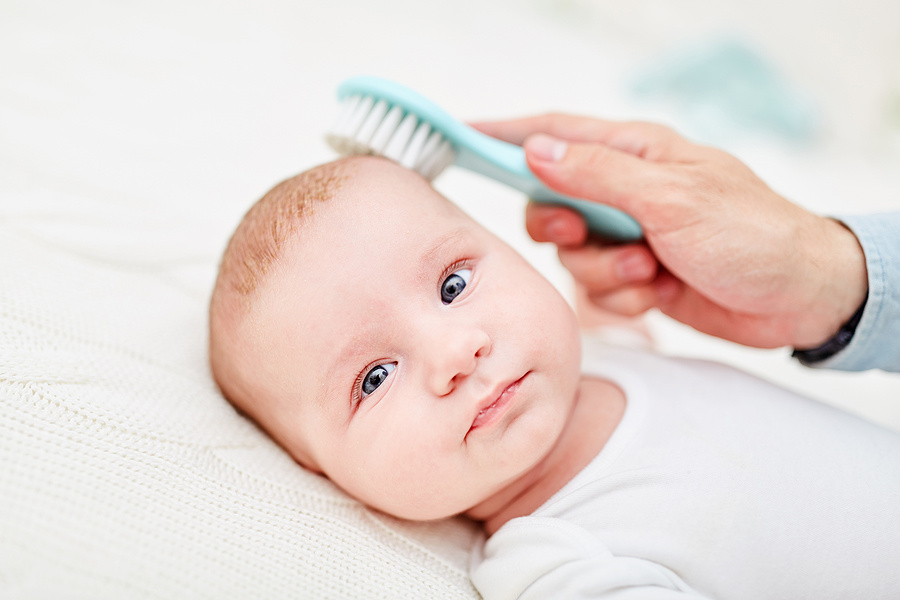
If you notice white and/or yellow scales on your baby’s scalp, don’t panic. Cradle cap is very common in newborn babies, and while it may look painful and itchy, it’s a harmless condition that causes very little discomfort, and it usually goes away on its own over time. We’re sharing everything you need to know about cradle cap below, including 3 simple natural cradle cap remedies that work wonders!
What Is Cradle Cap?
Seborrheic dermatitis (aka ‘cradle cap’) is a painless condition that causes crusty and oily scaly patches to develop on a baby’s scalp. It isn’t itchy, but the yellow and white scales it causes can become thick and difficult to get rid of. While the exact cause of cradle cap is unknown, research suggests it occurs as a result of an over-production of oil in the oil glands and hair follicles, which causes dead skin cells to stick to the scalp. It’s very common in newborns and babies and is easily treated with the natural cradle cap remedies below.
What Are The Symptoms of Cradle Cap?
Cradle cap causes the scalp to appear greasy, and for white and/or yellow patches of scales to develop. The scales are not itchy and may flake off on their own over time, and some babies suffer from hair loss in the area where scales appear on their scalp. If this occurs, rest assured their hair should grow back once the cradle cap disappears.
Sometimes cradle cap doesn’t create scales and flakes, but causes a change in the color of a baby’s scalp instead. Cradle cap can also develop on other areas of the body, such as the face, behind the ears, in the diaper area, and in the armpits.
Cradle cap is easily diagnosed and doesn’t require any testing. Your child’s doctor can usually make a diagnosis simply by looking at your child’s scalp (or other affected body parts).
3 Natural Cradle Cap Remedies
1. Wash your baby’s hair more frequently
If you’re looking for natural cradle cap remedies, one of the easiest things you can do is to wash your little one’s hair more frequently. Daily hair washing will keep your baby’s scalp clean and also help wash away excess oils that are contributing to the condition. Some people suggest using an anti-dandruff shampoo, but this should only be done under the guidance of a doctor in more severe cases. Use a mild baby shampoo instead, and speak to your baby’s doctor if the problem persists and you feel something stronger would be beneficial.
2. Brush your baby’s hair often
In addition to washing your baby’s hair more frequently, regular hair brushing is key if you’re looking for natural cradle cap remedies. Using a soft baby brush like this one will help loosen the scales on your baby’s head, and they will eventually start to fall off.
3. Moisturize your baby’s scalp
Another important step in treating (and preventing) cradle cap is to moisturize your baby’s scalp to help loosen the scales. Some articles on natural cradle cap remedies suggest using olive oil, but as this can increase the growth of yeast and potentially worsen the condition, coconut oil is thought to be a better option. Your pediatrician may have other recommendations, so speak to him or her first. Oils should be applied about 15 minutes before shampooing your little ones hair to help soften the crusts and scales on the scalp, and then should be thoroughly washed off so your baby’s oil glands don’t become blocked.
If these natural cradle cap remedies aren’t doing the trick and your little one’s scalp is red, inflamed, and irritated, your baby’s doctor may suggest using 1% hydrocortisone cream for a period of time. Once the condition is under control, you can use the remedies above to prevent the condition from returning!



